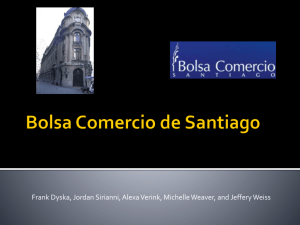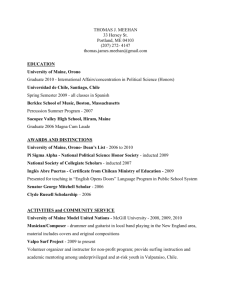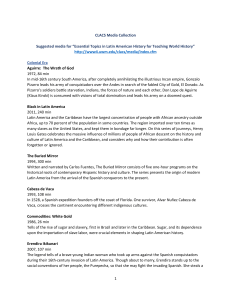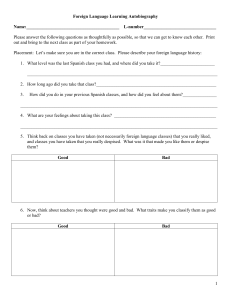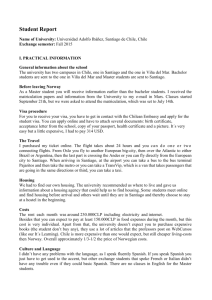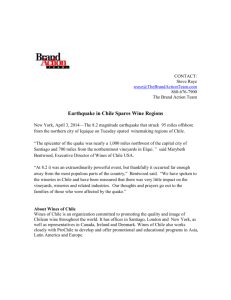GUIDELINES FOR WRITING THE EXPERIENCE REPORT E-mail:
advertisement
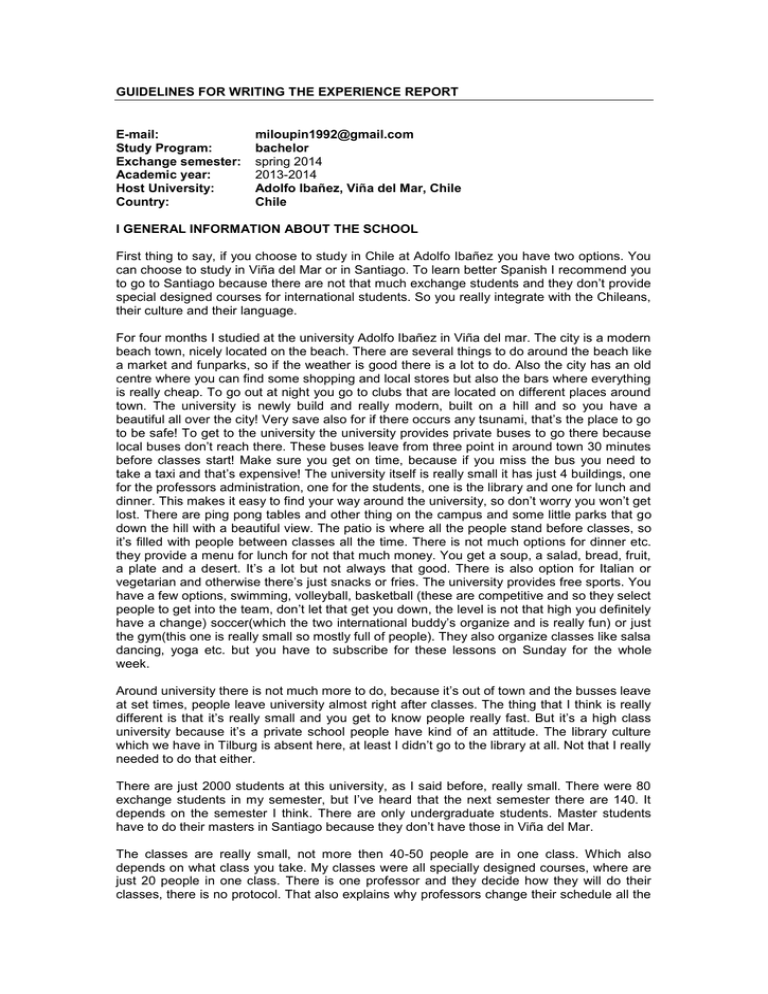
GUIDELINES FOR WRITING THE EXPERIENCE REPORT E-mail: Study Program: Exchange semester: Academic year: Host University: Country: miloupin1992@gmail.com bachelor spring 2014 2013-2014 Adolfo Ibañez, Viña del Mar, Chile Chile I GENERAL INFORMATION ABOUT THE SCHOOL First thing to say, if you choose to study in Chile at Adolfo Ibañez you have two options. You can choose to study in Viña del Mar or in Santiago. To learn better Spanish I recommend you to go to Santiago because there are not that much exchange students and they don’t provide special designed courses for international students. So you really integrate with the Chileans, their culture and their language. For four months I studied at the university Adolfo Ibañez in Viña del mar. The city is a modern beach town, nicely located on the beach. There are several things to do around the beach like a market and funparks, so if the weather is good there is a lot to do. Also the city has an old centre where you can find some shopping and local stores but also the bars where everything is really cheap. To go out at night you go to clubs that are located on different places around town. The university is newly build and really modern, built on a hill and so you have a beautiful all over the city! Very save also for if there occurs any tsunami, that’s the place to go to be safe! To get to the university the university provides private buses to go there because local buses don’t reach there. These buses leave from three point in around town 30 minutes before classes start! Make sure you get on time, because if you miss the bus you need to take a taxi and that’s expensive! The university itself is really small it has just 4 buildings, one for the professors administration, one for the students, one is the library and one for lunch and dinner. This makes it easy to find your way around the university, so don’t worry you won’t get lost. There are ping pong tables and other thing on the campus and some little parks that go down the hill with a beautiful view. The patio is where all the people stand before classes, so it’s filled with people between classes all the time. There is not much options for dinner etc. they provide a menu for lunch for not that much money. You get a soup, a salad, bread, fruit, a plate and a desert. It’s a lot but not always that good. There is also option for Italian or vegetarian and otherwise there’s just snacks or fries. The university provides free sports. You have a few options, swimming, volleyball, basketball (these are competitive and so they select people to get into the team, don’t let that get you down, the level is not that high you definitely have a change) soccer(which the two international buddy’s organize and is really fun) or just the gym(this one is really small so mostly full of people). They also organize classes like salsa dancing, yoga etc. but you have to subscribe for these lessons on Sunday for the whole week. Around university there is not much more to do, because it’s out of town and the busses leave at set times, people leave university almost right after classes. The thing that I think is really different is that it’s really small and you get to know people really fast. But it’s a high class university because it’s a private school people have kind of an attitude. The library culture which we have in Tilburg is absent here, at least I didn’t go to the library at all. Not that I really needed to do that either. There are just 2000 students at this university, as I said before, really small. There were 80 exchange students in my semester, but I’ve heard that the next semester there are 140. It depends on the semester I think. There are only undergraduate students. Master students have to do their masters in Santiago because they don’t have those in Viña del Mar. The classes are really small, not more then 40-50 people are in one class. Which also depends on what class you take. My classes were all specially designed courses, where are just 20 people in one class. There is one professor and they decide how they will do their classes, there is no protocol. That also explains why professors change their schedule all the time or their exams. Some professors only let you make papers and others use exams. But it’s always that you have to hand in something every week or 2 weeks. At the end there will be a final exam or final paper, but it doesn’t include all the information you got during the semester because they already examined it. II PRACTICAL INFORMATION How was your arrival organized? I had to organize my arrival myself. There was no organization for this. I came one month before university started to Chile, so there was no need to do that either way. Did someone pick you up from the airport/station? No. This was only for the American students, who had a special program. How was the reception at the school? There was not really a reception, they had an international office where you could go for every question you had. If you were at the wrong place they would tell or show you where to go. Was the administration and faculty well prepared for your arrival? It was okay prepared. Although we had to start a day later with university because things were not done yet. Well okay that wasn’t a really big problem for most of the students. What problems, if any did you encounter? The only problem was that our accounts for the university didn’t work for the wifi at the university, but that’s not that big of a problem! Orientation/Introduction activities Was an orientation or introduction activity organized? Yes, there was one day for the exchange students were we got a tour around campus and some information about school and town. Did the school’s students participate in the reception of the exchange students? No Did you have a student mentor/buddy? Yes, there were two buddies for all the exchange students. But the American exchange students had their own buddy, so there were 2 buddies for 40 students. Also two people at the international office. Housing How was accommodation organized? There was nothing organized I had to do it myself. Did you have to book your accommodation in advance or did you have to search for a place to live after you arrived? You can choose what you want. I spend one week in Santiago with familiars after that a took a two week intensive Spanish course which included housing for those two weeks. In those two weeks I searched for a new apartment to stay for the rest of my stay in Viña del Mar. What kind of housing does the university provide? None What support did you receive from the school in locating housing? I found out to late that I wasn’t in the right facebook group. In this group they posted recommendations or other exchange student posted when they were searching for a roommate. I recommend you to ask you study abroad advisor (Jaime Ignacio) to ad you to the group (maybe Alvaro is in that group too, I’m not sure though) Were you satisfied with your accommodation? Yes Any special issues or good ideas/useful websites for prospective students? www.compartodepto.cl This is the site where most of the Chileans post their available rooms. Watch out you don’t end up somewhere where there’s just working people living. And always ask if you can invite people over, either for dinner party or to sleep. Living Costs How did you finance your exchange period, apart from the grant you received from Tilburg University? My parents paid for my stay What were your living expenses abroad like compared to Tilburg? 200.000 pesos a month which is around 300 euros so it’s almost the same. But you can definitely find something cheaper. There’s a range from 150-350 I guess. What did you spend most of your money on? Food, which is pretty expensive. What would you advice future students to spend their money on? Traveling of course! There is so much to see in Chile and around! It so beautiful, you shouldn’t miss anything. I really recommend you not just to stay for a semester to study but to travel afterwards or before too! If you want to travel afterwards, I took a month, but I wish I took 2, because there’s so much to see and to do! Please outline your approximate monthly budget whilst on exchange: Housing (really depends on what your wished are you can find things for 150-300 euros) Food (200, food in supermarkets can be really expensive, there is a market called feria where you can find cheap fruits and vegetables, this market is every week on Wednesday and Saturday, both in Viña del mar and Valparaiso (ask any person where to find it, they’ll know) This really safes you in some money. Transport (30, transport around town is really cheap and the buses to university are free so around town it won’t even cost you 30 euros but if you want to travel you pay around 10-30 euros for a bus depends on where you’re going) Books (0, for the special designed courses you don’t need books and if you take Chilean courses you can rent books at the library) Miscellaneous (mostly on partying or traveling which at least is 400 euro a month) Academic Calendar Arrival date & introductory week My arrival date was the 3rd of February Introduction day was the 28th of February First day of the semester? First day of university was the 6th of March Last day of classes? Last day of classes were at the 21st of June Mid-term break? There is no midterm break. Besides that there are 4 free days. Examination period? For specially designed courses there is no examination period, this is just during the semester. For the Chilean courses the examination is from 7 th of July until the 12th of July. Although there is a lot to do for international students to replace this. Also a lot of the courses just do a paper or no end examinations Any special events? Not that I know of. The International Office Is there an international office? Yes Who is responsible for incoming exchange students? Alvaro Gómez H. Also Jaime Ignacio but he’s more responsible for at campus contact with the students. How does the international office function? You just go by the office whenever you need it. They are always there except for lunchtime. But you can always contact them through facebook when you really need them or even call them when it’s really important. Are you satisfied with the information provided to you by the international office? Yes it was all I need and I didn’t feel uncomfortable to walk in. Exchange promotion What kind of activity did you take part in to promote exchange to Tilburg University at your exchange university? Nothing, there was no. Social Activities Which social activities are organized by the university/students for exchange students? There was a welcoming barbeque (or asado as called in Chile). One was after the orientation day at the university, but because this one was without the American students we were just 40 people. The next week there was another welcoming barbeque where also the American student were present, so we could all meet each other. This ware the only activities really planned for the whole group. If we wanted to do something we had to arrange it ourselves, but because we have the lack of knowledge around and the lack of room this was really hard. I had the feeling there could be more organized by the university but they didn’t Is there a student organization for international student? No there isn’t. This is too bad because there are a lot of universities in Viña del Mar but also in Valparaiso which is right next to it so there are a lot of exchange students around. But there is a change to meet those students. There is an organization called Saint Jueves who’s name already tells you, they organize parties almost every Thursday for exchange students. This is where you meet a lot of exchange students but also a lot of Chileans who like to be around exchange student. You can define yourself what this could mean. I had a lot of fun at these parties every time I went so I really recommend you to visit. Did you have contact with local students? In the beginning the buddies brought some friends and local students to the barbeque where you could meet them at the end I didn’t have that much contact with the local students. I know that a lot of other people did especially because they took the Chilean courses. Did you have contact with other exchange students? Yes a lot. Because I took only specially designed courses I had all of them with exchange students. Most of them from the United States but from all over the world. Did you travel to other places/countries during your exchange? Yes I did. I went to Patagonia in southern Chile en Argentina! Really recommend you going the best travel time is I guess from November till march/beginning April. Because I went beginning April but I was really lucky with the weather. It can be really cold also in summer there is a strong breeze around. Also I recommend you doing the W or O hike to torres del Paine, I’ve heard a lot of good stories about it! Also I went to Pucon, which is also southern from Santiago and a bit of an adventurous town. You can hike up an active volcano, waterrafting, conyoning, horsebackriding, hydrorafting and a lot more. I went to La Serena and pisco Elqui, where you have the pisco valley (the national drink of Chile) here you can camp or walk around the valley, swim in the river, or take tours at the pisceras. Also the beaches in La Serena are really beautiful so the best time to go is in and around summer with good weather. San Pedro de Atacama, this is the driest dessert in the world, here you have a lot of excursion to do and it’s so beautifull. If you are going I recommend you doing at least a week so you can do a tour to Uyuni and the Saltflakes(Bolivia) too. This tour takes 3 days (if you stay in Uyuni) or 4 days (if you return to San Pedro de Atacama) . Of course also to Santiago, but wait a while till you get to know some people (exchange or locals) to show you around, that makes it way more fun! Culture and Language Did you experience culture shock while on exchange? Not really, I think it’s a really modern culture. The only thing is that they are a little slower in everything. If you meet at 6.30 you can definitely show up at 7.30 and still have to wait for the person you were meeting with. They also eat really late, don’t be surprised if restaurants don’t open before 8 because most of the Chileans eat around 9-10. Also they walk slower. The only thing they’re not slow in, is the talking, they talk really fast. But for everything else I think the culture is really similar as the one in Holland or at least not really shocking. What did you learn about your own culture while on exchange? I learn that we are really strict in everything. If we need to do thing, we need to do it good and you always feel the pressure. We eat at a set time and it’s really weird if you don’t and be late. If we have an appointment we are 15 minutes early. If we have an appointment and we can’t go you let people know you’re not going(this is a lack in Chile). We are really time set, we are on time for everything and if we have to wait it annoys us because our next thing to do is on schedule and you’re going to miss it(this is a thing in Chile you can wait somewhere for three hours) What was different about your host culture than you expected? They are really proud of their country but also they have a really strong feeling of togetherness. When there occurred an enormous fire in Valparaiso, all of Chile worked together to get the problem fixed or to helped the recently homeless people. It was even this crazy that there were to many people helping that they didn’t know what they had to do. Strong Valpo, Fuerza Valpo! It’s not something different than I expected, but it really surprised me. How would you describe your host country’s culture? Especially relax take it easy as long as you accomplish something, you’ll be fine. Family is important in this country but there’s not really a strong sense of religion active. But also a strong kind of people, they know what they want. They’re really straight forward and close to the people. It’s a typical Latin American culture, people with lots of temper, everything is just a little but more intensive. But it’s a little bit more modern. There’s not much culture left in the big cities like you will see in Peru or Bolivia, because it’s modernized you don’t see a lot of the old culture of before the Spaniards came in the country. What did you like and not like about your host culture? I loved everything I only had to get used to the closeness, because here in Holland we are used to a little bit of distance. But as soon as I got used to it, it’s something you start to appreciate and like a lot. Do you feel you learned a lot about your host culture, and if not, what would you like to learn more? I’ve learned a lot, but of course there’s always more to learn, I’m not a citizen for a long time If I really want to know all of the culture I would have to live there for over 2 years. Because there are also different types of cultures around the country because it’s a long country and I stayed just in one modernized city. I would have get another image if I stayed somewhere else probably. If you travelled to other cities/countries during your exchange, were they different than your host city/country, and how? They people in Bolivia are less opened or how to describe it, I didn’t stay there for too long but I had the feeling they had less respect for people traveling around and less eager to help you. Did you have any language problems with the faculty or other students? No, the people at the university spoke English and the students were mostly really understanding if y were struggling with the language. Did you follow language courses during your exchange? Yes, I took two courses. Intermediate communication and intermediate grammar in Spanish but the level is not that high. Did you follow the Erasmus Intensive Language Course? No, but I took a 2 week language course in Viña del Mar but I arranged it myself. Personal Development How do you think the exchange experience will affect you from a cultural and social point of view? I’m much more opened for experience and other people especially from other cultures. I feel like I connect a lot better with a lot of international people because I easily let them in. I like to have contact with them. Also I think I learned a lot on social perspective, I became more social know better how to interact with a new environment and new people. I’ve always been a little closed, but now I’m way more open. How do you think the exchange experience will influence your future career possibilities? I think the experience helped me to be more social, more interactive, not that much is holding me back anymore, I got more impulsive and I’m daring to take more risks. I think this will at least helps me to be more confident in the interview which will eventually help me to get a job. What did you learn from the people you met during your exchange? Just a lot more about the world, other cultures and information about the places they live in. It made me more interested in parts of the world, where is never been that interested in. Would you do things differently if you had the chance and what would you do differently? It took me a while to connect with the other students. I would have done this differently by just inviting people over, make up things to do and invite people to come join. I didn’t do this too much, but this is really necessary to get connected with people. I would have traveled more, every experience changes you your feelings, thoughts, expectations, relationships and learn you a lot about the world, nature, yourself and other people. What was your best experience, and what was your worst experience? My worst experience was when I fainted my first day in my apartment. The next day I woke up with the feeling I broke my toes and I couldn’t move my leg. I had to go to the hospital but I didn’t speak Spanish well enough and my landlord was the only person that could help me only I just met her. She was an only Spanish speaker also so even when I went to the hospital with her is still didn’t get what was going on. Definitely the worst experience ever. For me the best experience was watching the worldcup in Chile. We played against Chile in the groups. But it was just the people and the parties around it that made it a great experience. Soccer is BIG in Chile! It’s amazing! What will you never forget about your exchange period? The friends you make, I will never forget them I hope I will see them again soon! I still have a lot of contact with them so I hope so! Also all the people you meet all around the world you have a place to stay wherever you’re traveling to, for the coming period! What was the most important lesson you learned about yourself during your exchange period? I have to be more open for everything, be more social by just stepping to the people and talk, it’s way easier than you think to make friends. I always had the feeling it takes a while, but just hang out and see! I’ve been way too shy. III ACADEMIC INFORMATION Academic level at a host university In what language(s) are the courses offered at a partner university? English and Spanish. Did you follow any courses taught in the language of the host country? No Which courses did you take and why? Spanish intermediate communication and grammar, because I didn’t know any Spanish. Strategic leadership, because I thought that is something you can use always. Capitalism, socialism and communism in Latin America, because they didn’t provide us a lot of history at my high school about Latin America and I didn’t know. Because I was going to Latin America I wanted to know more about their history. Latin American culture and identity, because I wanted to get to know the culture of Latin America as soon and as good as possible. Which courses would you recommend? Of course the Spanish courses because it helps to improve your Spanish. And Capitalism, socialism and communism, because of the professor(he’s really nice and funny) but also because it’s really interesting. Also the level is not that high so you can have fun and learn a lot at the same time. Not recommended Latin American culture and identity, it’s a stupid professor and the subjects are not that interesting. How would compare the academic level at your host university to the academic level at Tilburg University (e.g.: level of the courses, use of extra material, level of English, workload, etc.)? In the beginning it looks like you have to do a lot, way more than in Tilburg for your courses. But the level of what you have to hand in is way lower and it’s really easy to get a good grade for not that much effort. Is the teaching style primarily practical or theoretical? Primarily theoretical. What teaching method is practiced by the host university: case studies, group work, seminars or lectures (or a mix)? Lectures How would you describe the relationship between the students and the teaching staff? The relationship is pretty close because the classes are small 15-30 people the teacher gets to know you and you get to know the teacher. In general, were you happy with your academic achievements during your exchange? I learned a lot but I don’t have the feeling I academically achieved something. That’s maybe because the courses weren’t that heavy. Exams What types of exams did you have to sit? I had tests at the end of the semester, but not big exams, or a paper I had to hand in. Some professors even used group works as final assessment. But during the semester you have to hand in assignments or they have little tests. Other Can students easily access the library and its resources? Yes it’s really easy, there only not that many computers, so bring your laptop and search for a place where you have access to a plug because they don’t have that many. You can rent all books for a day or for a whole week an you can even rent tablets. Were there public computers available on campus/in university buildings? The library has a few but the building for the students has some too with printers and everything. Description of Courses Course Español intermedio communicacíon Prerequisites None Exam Written and oral Español intermedio grammatical None Written Tests Latin American culture and identity None Written and oral Tests, presentation and paper Capitalism, socialism and communism in None Written and oral Assignments and presentation Latin America Strategic leadership None Written and oral Tests, assignment and presentation Tips for the future students: Would you recommend an exchange period? Definitely Would you recommend your host university? ECTS 6 Comments Hand-ins and presentations Of course because it’s a luxury! But also Universidad Catolica in Valparaiso, because there are a lot more exchange students but you integrate more with Chilean students. What should prospective students absolutely not forget before going on exchange Learn Spanish better than I did! Not because you won’t be able to get around without good Spanish, but because it makes it a lot more fun to get to know Chileans. And you definitely will do better when you’re Spanish is better! How can they better prepare before going on exchange to this destination? I don’t think you can prepare yourself better. The experience that is waiting for you is not something you can prepare for. Be prepared that everything is going to be different then you expected but better. Be open for everything so you don’t get surprised. And definitely say yes to everything! Let yourself be guided, but guide yourself too. Just take the necessary things with you and that’s enough. Was there anything you should have arranged before departure that you haven’t? I don’t think so, everything was well arranged and if not, there was enough opportunity to do it in Chile. A picture is worth a thousand words There is so much to see and to do! Here’s just a few of the things I have been visiting during my stay up-down ( Perito Moreno El Calafate Patagonia in Argentina, Canyoning in Pucon Chile, paragliding in Mendoza Argentina, Machu Picchu at Cusco in Peru) Blog I started writing my blog but I never finished so especially in the beginning you get a lot of my life in Chile, and not much of my traveling will be described. http://www.pindat.com/users/profile/miloupinchili
